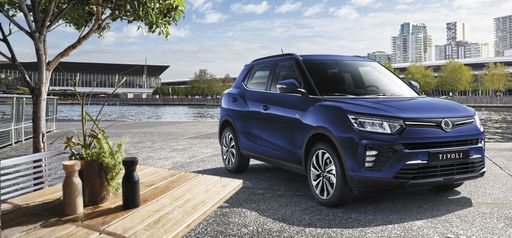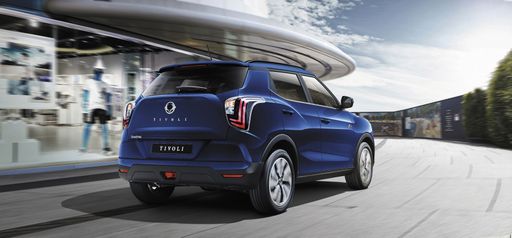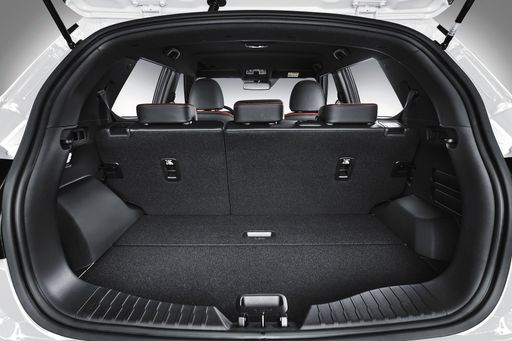SsangYong Tivoli VS Toyota Prius
SsangYong Tivoli
The SsangYong Tivoli is a compact SUV that seamlessly blends style with practicality, making it an appealing choice for urban drivers. Its sleek design is complemented by a well-crafted interior, offering a comfortable and spacious experience for passengers. With its reliable performance and modern features, the Tivoli stands out as a versatile option in the competitive compact SUV market.
detailsToyota Prius
The Toyota Prius stands as a pioneer in the realm of hybrid vehicles, offering an eco-friendly driving alternative with its innovative technology. Its aerodynamic design and comfortable interior make it a practical choice for those looking to reduce their carbon footprint without sacrificing style. Additionally, the Prius boasts a reputation for reliability and efficiency, contributing to its lasting popularity among environmentally conscious drivers.
details @ Ssangyong
@ Ssangyong
 @ Ssangyong
@ Ssangyong
 @ Ssangyong
@ Ssangyong
 @ Toyota
@ Toyota
 @ Toyota
@ Toyota
 @ Toyota
@ Toyota
 @ Toyota
@ Toyota

|

|
|
|
|
Costs and Consumption |
|
|---|---|
|
Price
about 23100 - 32700
$
|
Price
about 42500 - 49400
$
|
|
Consumption L/100km
7 - 8.3
L
|
Consumption L/100km
0.5 - 0.7
L
|
|
Consumption kWh/100km
-
|
Consumption kWh/100km
-
|
|
Electric Range
-
|
Electric Range
72 - 86
km
|
|
Battery Capacity
-
|
Battery Capacity
-
|
|
co2
161 - 191
g/km
|
co2
12 - 17
g/km
|
|
Fuel tank capacity
50
L
|
Fuel tank capacity
40
L
|
Dimensions and Body |
|
|
Body Type
SUV
|
Body Type
Hatchback
|
|
Seats
5
|
Seats
5
|
|
Doors
5
|
Doors
5
|
|
Curb weight
1375 - 1492
kg
|
Curb weight
1620 - 1630
kg
|
|
Trunk capacity
395 - 720
L
|
Trunk capacity
284
L
|
|
Length
4225 - 4480
mm
|
Length
4599
mm
|
|
Width
1810
mm
|
Width
1782
mm
|
|
Height
1613 - 1646
mm
|
Height
1470
mm
|
|
Payload
425 - 455
kg
|
Payload
365 - 375
kg
|
Engine and Performance |
|
|
Engine Type
Petrol
|
Engine Type
Plugin Hybrid
|
|
Transmission
Manuel, Automatic
|
Transmission
Automatic
|
|
Transmission Detail
Manual Gearbox, Automatic Gearbox
|
Transmission Detail
CVT
|
|
Drive Type
Front-Wheel Drive, All-Wheel Drive
|
Drive Type
Front-Wheel Drive
|
|
Power HP
163
HP
|
Power HP
223
HP
|
|
Acceleration 0-100km/h
-
|
Acceleration 0-100km/h
6.8
s
|
|
Max Speed
175 - 181
km/h
|
Max Speed
177
km/h
|
|
Torque
260 - 280
Nm
|
Torque
-
|
|
Number of Cylinders
4
|
Number of Cylinders
4
|
|
Power kW
120
kW
|
Power kW
164
kW
|
|
Engine capacity
1497
cm3
|
Engine capacity
1998
cm3
|
|
Top speed
175 - 181
km/h
|
Top speed
177
km/h
|
General |
|
|
Model Year
2021 - 2024
|
Model Year
2023
|
|
CO2 Efficiency Class
F, G
|
CO2 Efficiency Class
B
|
|
Brand
SsangYong
|
Brand
Toyota
|
SsangYong Tivoli
Discover the SsangYong Tivoli: A Blend of Comfort and Performance
In the realm of compact SUVs, the SsangYong Tivoli has carved out a niche for itself with its blend of robust performance and luxurious comfort. Catering to a diverse range of drivers, the Tivoli stands as a testament to SsangYong's commitment to innovation, efficiency, and style. This article dives into the technical brilliance and innovations that make the Tivoli a standout choice in its segment.
Performance Unleashed: Under the Bonnet of the Tivoli
The SsangYong Tivoli does not shy away from showcasing its engineering prowess. With a powerful 1.5 GDI-T petrol engine under its bonnet, the Tivoli offers a thrilling 163 PS (120 kW), ensuring a spirited drive. This engine is paired with either a manual or automatic transmission, providing drivers with options to match their driving preferences.
The Tivoli's performance metrics are equally impressive, boasting a torque range between 260 and 280 Nm. These figures translate to a responsive and dynamic driving experience, whether you're navigating city streets or cruising on highways. Top speeds range from 175 to 181 km/h, underscoring the Tivoli's versatility as a daily driver with an adventurous side.
Efficient on the Roads: Fuel Economy and CO2 Emissions
Efficiency is a hallmark of the Tivoli, with fuel consumption figures ranging between 7 and 8.3 L/100km, depending on the chosen configuration. It's not just about performance; the Tivoli strikes a balance by ensuring environmental considerations are met, with CO2 emissions between 161 and 191 g/km, placing it in the CO2 efficiency classes of F and G.
Innovative and Spacious Design
Designed with the modern driver in mind, the Tivoli combines functionality with style. Its exterior dimensions—spanning a length of 4225 to 4480 mm—create a commanding presence on the road, while its height of 1613 to 1646 mm and width of 1810 mm suggest ample interior space. With a boot space offering 395 to 720 litres, the Tivoli caters to both urban living and adventurous getaways.
Comfort Meets Technology: Inside the Tivoli
The interior of the Tivoli is a reflection of SsangYong's dedication to comfort and technology. Accommodating up to five passengers, the Tivoli ensures every ride is a comfortable journey with advanced features and materials. The availability of various trim levels, such as the Amber, Blackline, and Quartz, allows for personalisation, meeting the specific needs and desires of each driver.
The Tivoli's Commitment to Safety
Safety remains a priority for SsangYong, and the Tivoli is no exception. Equipped with a range of safety features, including a reinforced body structure, multiple airbags, and advanced driver assistance systems, the Tivoli ensures peace of mind for all occupants.
Conclusion
The SsangYong Tivoli is more than just a compact SUV; it is a symbol of outstanding engineering fused with everyday practicality. Whether it's the daily commute or a weekend getaway, the Tivoli is equipped to handle a variety of driving scenarios with style and efficiency. For those seeking a vehicle that combines reliability with cutting-edge technology, the Tivoli stands as a noteworthy contender in the SUV market.
Toyota Prius
The All-New Toyota Prius: Revolutionising Efficiency and Performance
The Toyota Prius, a name synonymous with hybrid innovation, has once again shown why it remains at the forefront of eco-friendly automotive technology. The latest models have enhanced technical features and innovations, setting new standards for efficiency and driving experience.
Hybrid Performance: A Leap Forward
The latest Prius models employ a sophisticated 2.0 litre Plug-in Hybrid system that flawlessly melds petrol and electric power. With a power output of 223 PS, it propels the Prius with impressive dynamism, reaching 0-100 km/h in just 6.8 seconds. This performance-oriented aspect of the Prius does not compromise on efficiency, with an astonishing fuel consumption ranging from 0.5 to 0.7 L/100km.
Electric Range and Efficiency
One of the key highlights of the new Prius is its substantial electric-only range. Depending on the variant, it can travel between 72 to 86 km on electric power alone, making it an ideal choice for urban commutes where zero emissions are preferred. The hybrid system's CO2 emissions are remarkably low, between 12 and 17 g/km, contributing to its CO2 Efficiency Class B rating.
Engineering Excellence with CVT
The Prius is equipped with a state-of-the-art Continuously Variable Transmission (CVT), ensuring a smooth and efficient drive. This advanced transmission supports the front-wheel-drive layout, delivering power seamlessly and enhancing driving pleasure without sacrificing fuel economy.
Stylish Design and Comfort
Designed as a sleek five-door hatchback, the Prius offers a comfortable and spacious interior with seating for five passengers. It measures 4599 mm in length, 1782 mm in width, and 1470 mm in height, offering a practical balance of size and comfort. The boot space, while tailored for the hybrid battery, still provides a decent 284 litres of storage.
Cost Efficiency
The running costs of the Prius are competitive, with monthly expenses estimated between €1064 and €1188, and cost per kilometre ranging from 42.6 to 47.5 cents. Its efficient design results in a maximum speed of 177 km/h and a practical fuel tank size of 40 litres, ensuring less frequent stops on longer journeys.
Conclusion: The Prius Legacy Continues
The Toyota Prius continues to lead by example in the realm of hybrid technology. Combining impressive power with unmatched efficiency and a sophisticated driving experience, it is clear that the Prius remains a compelling choice for the environmentally conscious driver. Its innovative features and favourable cost metrics only bolster its appeal in the modern automotive landscape.
